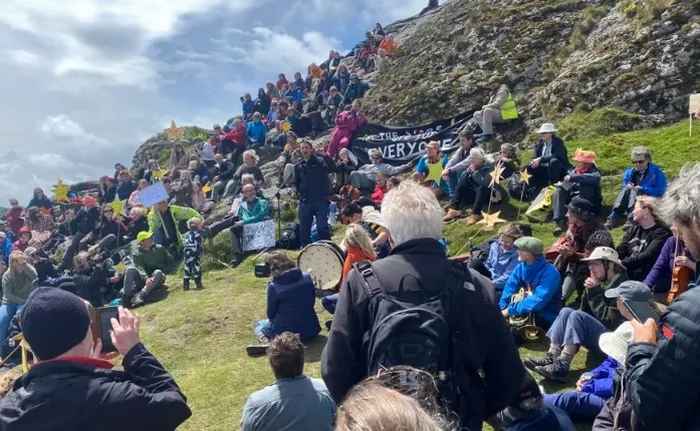Hundreds of Right to Roam supporters and outdoor enthusiasts gathered this week at Haytor on Dartmoor to celebrate a landmark legal victory affirming the right to wild camp on the moor — and to call for sweeping reforms to public access laws across England and Wales.
The mood on Dartmoor was one of celebration and renewed determination as campaigners assembled around the iconic granite rocks. They had reason to rejoice: a potentially devastating court ruling was narrowly averted when the UK Supreme Court upheld the public’s right to wild camp on Dartmoor, rejecting the arguments made by wealthy landowner Alexander Darwall.
Had the ruling gone the other way, the mood would have been starkly different. There was a real risk of losing the last bastion of legal wild camping in England. Protesters feared the implications — not only for hikers, nature lovers, and families seeking to enjoy the outdoors, but also for the already overstretched Dartmoor National Park Authority, which had been facing massive court costs. Their successful legal defence ensured the preservation of a unique public freedom and protected the authority from financial ruin.
Instead of mourning a lost right, campaigners turned the event into a rallying cry. Buoyed by the Supreme Court’s clear support, the gathering became a launchpad for a more ambitious mission: to expand wild camping rights and create a comprehensive outdoor access code similar to Scotland’s. In Scotland, responsible wild camping is permitted across most public lands — a freedom not currently shared by the rest of the UK.
Addressing the crowd, Lewis Winks of the Right to Roam and The Stars Are for Everyone campaign groups thanked Darwall — somewhat ironically — for drawing national attention to just how limited public access rights are in England and Wales. His legal challenge, while ultimately unsuccessful, has dramatically accelerated momentum behind the campaign for broader reform.
Access campaigner and author Guy Shrubsole, co-founder of the “Who Owns England” project, delivered a rousing speech, declaring: “Where Dartmoor leads, the rest of England and Wales will follow.” He pointed out the irony that prior to the ruling, Dartmoor was the last place in England where wild camping was legal. With the Supreme Court decision now secured, it becomes the first and only protected area for such freedom — a reversal he and others hope to build upon.
Shrubsole and Winks admitted they were deeply anxious about the outcome of the case but are now channeling the positive energy into a campaign for a Right to Roam Act — a bold legislative move that would drastically expand public access to wild lands.
Though political support appeared strong before the last general election, with the Labour Party, Liberal Democrats, and Greens pledging support for better access rights, campaigners worry that lobbying from private landowners may have softened the resolve of some politicians. Still, optimism was renewed by a strong show of support last week, when MPs from all three parties joined demonstrators outside the Supreme Court, proudly holding a Right to Roam banner.
One such supporter, Labour MP Phil Brickle, sent a heartfelt letter expressing solidarity with the movement. Though he couldn’t attend the Haytor event, South Devon Liberal Democrat MP Caroline Voaden was present and delivered a passionate speech. Echoing the sentiment expressed by Winks, Voaden said: “We owe a debt of thanks to Alexander Darwall, for spending half a million pounds on energising the campaign to improve access to the countryside.”
She also criticized Darwall’s priorities, suggesting that instead of funding a court battle, he could have put the money towards conservation efforts — repairing overgrazed areas, funding park wardens, or investing in outdoor education for youth. Amid laughter from the crowd, she quipped: “He could have bought boots and tents… but instead he spaffed it up a courtroom wall.”
The event’s most emotional moments came during the speech by Tom Usher, CEO of the Dartmoor Preservation Association (DPA). The DPA has been a vocal and practical supporter of wild camping rights and had pledged to help the Dartmoor National Park Authority cover legal fees in the event of a loss. With the ruling now in their favour, and Darwall likely to be ordered to pay court costs, the DPA plans to redirect its fund — currently standing at around £200,000 — toward improving public access to Dartmoor.
Usher announced that the money would go into existing DPA initiatives like the Youth Ranger Program and Nights Under the Stars, which introduces young people from all backgrounds to camping and nature. He also unveiled plans for a new Dartmoor Public Access Fund, through which individuals or groups can apply for support to promote outdoor experiences on the moor.
The rally concluded with a resounding message: the fight is far from over. While Dartmoor’s legal victory is a monumental step, campaigners insist it must serve as the beginning of a broader movement to secure similar rights throughout the UK. They envision a future where access to wild camping is not a privilege restricted to one park, but a nationwide freedom grounded in law, education, and shared respect for the land.
This vision, now backed by renewed public support and political momentum, seems closer than ever — and the message from Haytor was clear: the stars belong to everyone.
Related Topics
- Minnesota’s Sol Vind Retreat: The Ideal Gateway for First-Time Campers
- Winter Wonders: Discover Australia’s Top Cold-Weather Camping Destinations
- Smart Camping Tips to Elevate Your Outdoor Adventures This Summer

